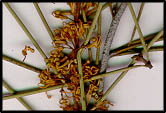South West Slopes Revegetation Guide
Hakea tephrosperma
Hooked Needlewood
Select from the following for detailed images.
Species Information
| Synonyms |
H. patula, H. bifrons, H. glabriflora |
| Common Names |
Hooked Needlewood, Small-fruit Hakea |
| Family |
Proteaceae - Protea family. |
| Name Origin |
tephrosperma - from Greek tephro, ash grey and sperma, seed, referring to ash-coloured seed (not always apparent). |
Specimen Data - CSU 527
| Location |
On roadside on north east corner of Old Terrick State Forest, 40m south of north east corner. Near Mittiamo Victoria. |
| Notes |
Rare - small clump of 6 old bushes and many surrounding suckers. Zone: 55 Easting: 252559 Northing: 5998674 |
| Collector |
Kent, Kylie & Lunt, Ian |
Date |
27/09/1999 |
| Determined By |
Lunt, Ian |
Date |
25/10/1999 |
South West Slopes Revegetation Guide Information
| Regional: |
Not widespread, but more common in west of region. Noted in the areas: Brookong; Boree and Narrandera-Morundah-Galore-Collingullie. |
| Australia: |
Qld, NSW, Vic, SA. |
| Habitat: |
Usually on coarse-textured soils, as individual trees or in dense thickets of shrubby plants. |
| Habit: |
Small tree or shrub 3-12 m high. Often with drooping branches. Sparse crown of cylindrical leaves 2-9 cm long. |
| Similar Species: |
Distinguished from Needlewood (Hakea leucoptera) by curved points on its leaves, minutely hairy flower stems and dark-coloured seed wing. |
| Site Preference: |
|
| Characteristics: |
|
| Flowering: |
Cream, spring. Attractive spider-like flowers. |
| Seed Collection: |
Easily collected when seed available, generally winter-spring. Seeds retained on plants. |
| Propagation: |
Most Hakeas easily grown from fresh seeds which usually germinate in 3-6 weeks. Direct sow into pots (2 seeds per pot) or into field. |
| Regeneration: |
Mainly from root suckers, particularly when protected from grazing. |
| Timber: |
Deep-red with attractive 'cartwheel' pattern. Turned to produce small ornaments. |
| Shade and Shelter: |
|
| Land Protection: |
|
| Wildlife: |
Excellent cover for small native birds. Flowers are a food source for honeyeaters. |
| Ornamental: |
Attractive woody fruit, and beautiful flowers if mass-planted. Very hardy in cultivation. |
| Other: |
Nectar can be sucked from flowers or mixed with water for sweet drink. |
Note: The following information presented is only a guide, as plant characteristics vary depending on provenance (the plant's locality).
| Site/Preferred Habitat : |
coarse soils |
| Rainfall(mm) : |
300 |
| Growth Rate : |
slow |
| Tolerates : |
moderate frost |
| Resents : |
|
| Uses & Comments : |
timber; wildlife; ornamental |
Return to Database List
